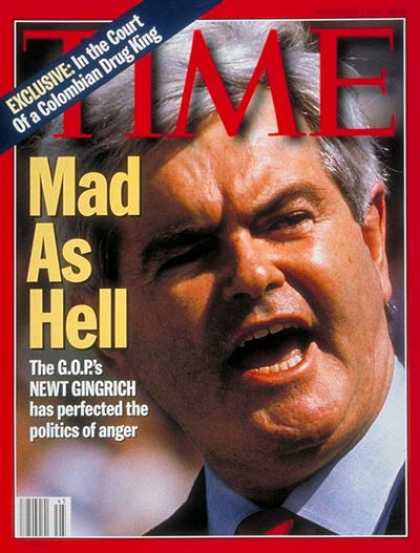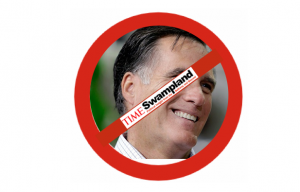I’ll never forget the moment. It was very late on election night in November, 1994, and I was at a friend’s house transfixed by election coverage. The Republicans had done it. Led by Newt Gingrich, the combative Georgia congressman, they had ended decades of Democratic dominance in the House, they were taking the Senate, and Bill Clinton was on the ropes.
Here was the triumph, recorded for posterity on YouTube:
This was the “Republican Revolution,” the moment when the party — demoralized by defeat in 1992 — was reborn, when the grassroots conservative movement cultivated by Ronald Reagan finally achieved dominance. We were sure our best days were ahead. Gingrich would confront the hated Bill Clinton (people forget how much conservatives loathed Bill Clinton) and our brilliant champion would win the day. Victories in Congress would be followed by victory two years later, and Reagan’s vision of a conservative America would finally be realized. It was a great night.
Sadly, it was also our best night. What followed was perhaps the most agonizing slow-motion train wreck of my political life.
Our champion walked into the arena, faced off against Bill Clinton, and was crushed. For those with long political memories, the stories are well-known:
-Gingrich shut down the government partially because he was annoyed at his seating on Air Force One . . . and admitted it to the press.
-He was the first sitting Speaker reprimanded for ethics violations, with the vast majority of Republicans voting against him.
-Even before Clinton’s resounding re-election, Gingrich was arguably the least-liked politician in the entire country, with only 9% of (yes, you read that correctly, nine percent) of Americans wanting him to become president and 49% calling him “scary.” By 1997, his approval rating was a dismal 25%. He became known as the “nation’s most unpopular politician.”
-Even as Bill Clinton was being impeached, Newt Gingrich was carrying on an affair (and not his first), an affair he carried on for years before ending his second marriage, a marriage that was also born in an affair.
-Despite being an open secret in Washington, Gingrich didn’t publicly admit his affair until 2007, almost a full decade later, as he mulled a presidential run.
-He endured revolts against his leadership, including revolts led by some of the House’s leading conservatives.
-He finally resigned in disgrace in 1998 even as his nemesis, Bill Clinton, continued to enjoy shockingly high approval ratings.
-When George Bush emerged in 1999 with his “compassionate conservative” message, it was consciously designed to distance Republicans from the Gingrich era. He couldn’t ride the wave of the Republican Revolution; the wave had already crashed.
To be sure, Gingrich did have some significant accomplishments. Welfare reform was critical, and the federal government did grow at a slower rate, so our massive tech-fueled economic boom took us to a short-lived surplus. But can he take more credit for these things than Bill Clinton? The economy of the 1990s was no more the “Gingrich boom” than our current economy represents the “Boehner stagnation.”
As we look at these facts, I must confess that I’m amused when fellow conservatives state with absolute certainty that Newt Gingrich will somehow dominate Barack Obama in debates and on the campaign trail. Really? After all, Barack Obama is the only politician in America to have defeated the Clinton machine, and his campaign often reduced Bill himself — one of the most gifted politicians of my lifetime — to sputtering, impotent rage.
I’m much less amused by growing evangelical support for Gingrich. Yes, he’s pro-life, but so is every single Republican in the race (it may be the only issue they all agree on). But what about the three marriages? The serial affairs? The ethics reprimand? And let’s not forget about humility. Newt Gingrich may well have the most transparent self-regard of any leading politician in America. I have a serious question: If evangelicals choose to reject numerous alternatives and wrap both arms around a serial philandering, hopelessly grandiose politician, then what is our distinctive witness in this process? Do we have one?
Yes, I understand repentance. By all accounts, his conversion to Catholicism has been genuine and positive. But do we want to look at that past and nominate a man to the presidency just trusting that our nation’s highest office — the most powerful and consequential political office in the world — will be his first scandal-free government post?
I remember the thrill of victory in November, 1994. I also remember the agony of defeat in the years that followed and lasting consequences of those losses. It’s an experience I do not want to repeat.











